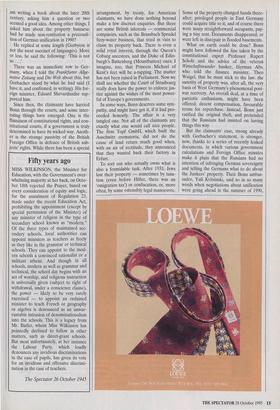Fifty years ago
MISS WILKINSON, the Minister for Education, with the Government's over- whelming majority at her back, on Octo- ber 18th rejected the Prayer, based on every consideration of equity and logic, for the annulment of Regulation 23, made under the recent Education Act, prohibiting the appointment (except by special permission of the Minister) of any minister of religion in the type of secondary school known as "modern." Of the three types of maintained sec- ondary schools, local authorities can appoint ministers as teachers as freely as they like in the grammar or technical schools. They can appoint to the mod- ern schools a convinced rationalist or a militant atheist. And though in all schools, modern as well as grammar and technical, the school day begins with an act of worship, and religious instruction is universally given (subject to right of withdrawal, under a conscience clause), the power — likely to be very rarely exercised — to appoint an ordained minister to teach French or geography or algebra is denounced as an unwar- rantable intrusion of denominationalism into the schools. This is a legacy from Mr. Butler, whom Miss Wilkinson has pointedly declined to follow in other matters, such as direct-grant schools. But most unfortunately, at her instance the Labour Party, which loudly denounces any invidious discriminations in the case of pupils, has given its vote for an invidious and offensive discrimi- nation in the case of teachers.
The Spectator 26 October 1945


































































 Previous page
Previous page